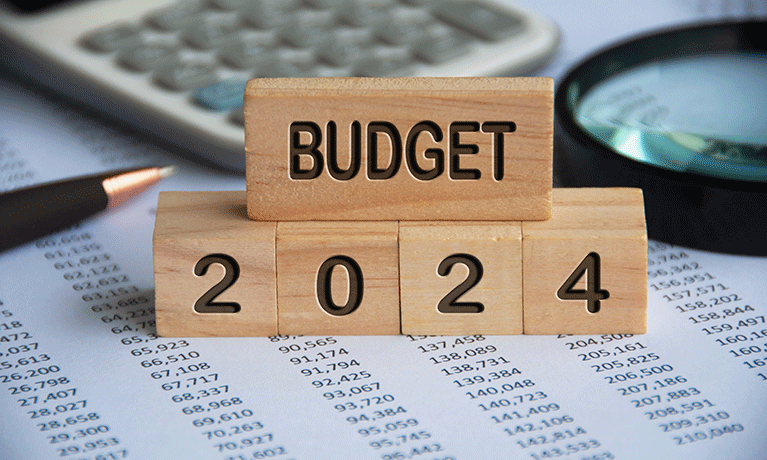By Professor Glauco De Vita, Centre for Business in Society
How political was Hunt’s pre-election Budget? And did the Budget live to expectations?
In what was anticipated to be ‘the general election Budget’ meant to ‘lighten the tax burden’ and thus ease the hardship imposed by the cost-of-living pressures, in light of the pre-Budget warnings from the IMF and the Office for Budget Responsibility’s latest forecasts (which gave the Chancellor ‘limited headroom’), any such giveaways could only be funded by either spending cuts or other tax rises (rather than more borrowing). It is fair to say that we witnessed a modest amount of both from Jeremy Hunt today in what could be described as a fairly timid, no ‘big-surprise’, and thus somewhat ‘prudent’ pre-election Budget, especially since many tax changes announced in this Budget, happened against the backcloth of tax rises that had already been announced previously (most notably, the stealth tax stemming from the freeze until 2007/2028 of personal tax thresholds).
So, yes, a ‘no gimmicks’ Budget, but also one which saw no significant let alone radical steps, neither on tax cuts (despite the 2% National Insurance reduction) nor in tweaking the government’s self-imposed fiscal rules, which whilst aiming to keep debt at a level that does not prove devastating to future generations, heavily constrain our capacity to invest today as a nation in order to grow tomorrow. In short, a safe Budget that won’t risk repeating the Truss/Kwarteng horror, but one unlikely to improve Tory fortunes.
What are we to make of the reduction in personal taxes through a further 2% cut in the National Insurance contributions?
Rishi Sunak had already hinted at another cut in national insurance (NI) in the run up to the spring budget, which is seen also by the Chancellor as a tax on work. There is certainly some truth in the idea that cutting NI rewards hard work (benefiting only people of working age, who are ‘in work’). Another added benefit of this tax-cut measure is that it costs the government about 40% less than an equivalent cut in the (20p) basic income tax rate. But the Conservatives’ cut in NI ‘to help working people’ will be seen by many as a last resort attempt to win back votes and thus bribe the electorate at the cost of further austerity in the public sector, de facto sabotaging prospects for the next government. Yet, the benefit for ordinary people is still somewhat limited, with the average earner gaining a mere £40 net pm from the tax-cut.
The Chancellor also extended the freeze on fuel duty for another 12 months, with the freeze on alcohol duty extended until February 2025. But we also saw some other taxes go up in this Budget, such as a one-off increase in tobacco duty, a new excise duty on vaping products, the removal of tax relief for holiday lets (which also improves availability of long-term rentals), the abolition of the ‘non-dom’ tax regime (the latter currently granting non-UK domiciled individuals living in the UK special tax privileges), and the extension of the windfall tax on oil and gas companies for an additional year (until 2029). However, all in all, irrespective of what the Chancellor announced today, at the end of this Parliament, taxes – which are still at an historic high – are going to be higher than they were at the beginning.
Were there other significant measures announced in the Budget to pave the way for growth, stability and better public services?
Other fairly marginal measures announced today include and new British ISA to allow an additional £5k individual allowance for UK-listed equities, changes in the amount businesses can earn before registering for VAT (to increase from £85k to £90k), further ‘levelling up’ funding (£100m) to support cultural projects in communities, some funding as well as increases in tax credits and reliefs for segments of the creative industries, an additional £45m to support research by medical charities into dementia, cancer and epilepsy, planned growth in daily public sector departmental spending to be kept at 1%, and a commitment to honour the previously announced funding for the NHS productivity plan, with a £2.5bl to the NHS aimed at reducing waiting times.
What does this Budget do for the short- and long-term prospects of the UK economy?
With the time for a cut to interest rates “still some way off” according to Bank of England’s Chief Economist, the battle against inflation yet to be won (the CPI inflation measure is at 4%, double the government’s target of 2%), a 2023 record of near-zero growth (with the GDP growth figures of the last two consecutive quarters of 2023 crossing the threshold of a technical recession), the measures announced today do little at best (if anything) to provide significant relief to those households most in need, grow the economy (forecasts suggest UK growth will remain sluggish in 2024) and get debt falling (as the UK government is spending more than it has ever done before on debt interest to service the huge UK public debt). These indications are worrying especially since low inflation, high growth, significant investment in public services and the concomitant reduction of debt, are the key drivers alongside economic equality that should underpin UK’s long-term prosperity.
Through understanding the impact of organisations’ activities, behaviours and policies, the Centre for Business in Society at Coventry University seeks to promote responsibility, to change behaviours, and to achieve better outcomes for economies, societies and the individual.




Comments are disabled